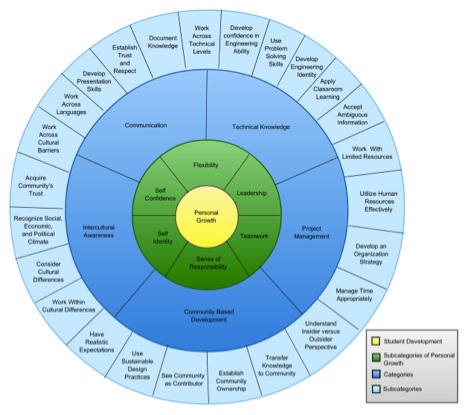What impact does international engineering have on student’s development? What types of skills, knowledge, and attitudes do they acquire while doing engineering work abroad? How can we bring the value of these learning experiences into more traditional learning environments?
These were the primary questions addressed by our research team as part of a three year study. The findings and materials posted here represent some of our conclusions.
This diagram represents the diverse range of knowledge, skills, and attitudes developed while abroad. For further discussion on this see the student development section.
International service engineering is a unique experiential learning experience with great potential to contribute to a student’s development. Because of the highly interdisciplinary and practical nature of these projects, students learn skill sets that tie their engineering intelligence to the complex and dynamic reality of the world in which it will be used. Our research was interested in identifying precisely what skills, knowledge, and attitudes are developed through these experiences in order to create learning materials that foster this type of growth for a wider range of students.
The areas of growth we identified through our work are valuable to any student, no matter there future career. Especially given the global context we all live, it seems valuable to instill these skills, knowledge, and attitudes in students.
Background of this Project
The findings, learning objectives, and instructional materials presented here are based on research from actual learning experiences of student participants in international engineering projects. Prior research has shown the diverse set of skills and multiple intelligences needed to be successful in such pursuits. Proper instruction and guided experiences can allow students to foster these skills while participating in international service learning. However, instructors must be intentional about designing material that appropriately introduces students to the complexity of international work.
The holistic framework presented here will guide instructors through this process. We believe the academic community has a responsibility to contribute to socially responsible and sustainable development work. Through teaching students bottom-up, community-based development techniques they will be better suited for putting the societal needs of those they are serving at the forefront of their engineering work.
Our Role
Our research team intends to continue developing curriculum and other supplementary materials designed to meet these credentials. By continuing to work with students on a firsthand level, the team will be able to assess how the utilization of new educational materials impact their overall development. Others are encouraged to share the knowledge and resources they have created surrounding this topic to further advance this realm of study.
We hope the results of this research and the instructional materials are utilized by a variety of audiences and in a wide range of contexts. Though there is not an equal substitute for on-site experience, the goal of our team is to develop methods that will foster the proper knowledge, skills, and attitudes acquired by international engineering experiences in a domestic setting. This would allow for a larger range of students to experience the eye-opening and transforming personal development that has been seen as a result of on-site international engineering experiences.


